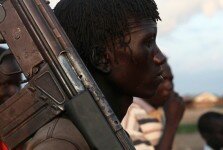Paris – The often quarrelsome French who make it a point of honour to shout their differences, for a parking spot or a high-minded idea, joined in a single cry of “Charlie” at Sunday’s unity march, the largest demonstration in Paris since France started keeping track. And that harmonious melding of citizens of all races and colours was breathtaking.
I have attended scores of demonstrations in my three decades as a Paris-based reporter, and never before encountered such huge, and peaceful, shoulder-to-shoulder crowds. No tear gas, no angry demands, no nastiness of any kind reported. Yet the stakes are higher than anything the French had previously marched for. This time it was for democratic values that include the right to freedom of expression. These are values that the terror attacks by three French citizens, all Islamist radicals, sought to undermine, it is widely agreed – and force the nation that gave birth to the Enlightenment to go dark.
“Je suis Charlie or “We are Charlie” or simply “Charlie” was the overriding slogan of the march, a phrase the world has taken up since the Jan. 7 newsroom massacre in the offices of the irreverent, satiric weekly Charlie Hebdo. France lost some of its top cartoonists.
Even police officers, the fearsome silent presence at most demonstrations, where they occasionally move into action with tear gas and clubs, got their reputations dusted. Three were killed in the recent attacks and, with authorities fearing more terror, the citizenry is coming to appreciate their vigilance. The crowd applauded wildly as a line of police vans made its way through one packed boulevard leading to the Place de la Republique, the starting point of the march that some people never left – and others never reached. “Bravo police!” the people cheered.
“It’s a different world today,” said Michel Thebault, among those clapping. At 70, he lived through the student movement of 1968 that shook the foundations of France with street battles between police and protester and general strikes that brought the country to a standstill -an image that shadows authorities to this day.
“Nearly 50 years ago, we were in this spot shouting “CRS-SS,” comparing France’s riot police to Hitler’s SS troops. “Today we’re happy to have police here.”
France knows it must be careful. Demonstrations are a national pastime, and a safety valve to air grievances against the government. But they can get unruly, and violent, when the subject is sensitive.
The last demonstration of such breadth that I covered was the joining of the political right and left to ensure that far-right leader Jean-Marie Le Pen wouldn’t become France’s new president. That was in 2002 when Le Pen reached the final round of voting and was facing off against conservative incumbent Jacques Chirac. Such a joining of rightist and leftist forces for a march from the Place de la Bastille was a spectacular political event. Chirac won 82 percent of the vote.
The message at Sunday’s march was broader yet, and more inclusive: everyone opposed to terrorism and in favour of freedom of expression and other fundamental values. To wit, a handmade sign carried by a young black man read, in fluorescent orange letters, “No and no to barbarity. Yes and yes to living together in love.”
In Sunday’s march, there were no sides, no left and right of the political spectrum, no I’m right, you’re wrong. There was only one way forward: together.
That sounds a bit churchy and the French, mostly, don’t go to church. In fact, the France of today is no longer a society of Roman Catholics. It is deeply secular, but also has the largest Muslim and Jewish populations in Western Europe, and each of those populations, like all French, have heavy stakes in whatever comes next. And so the march was a sort of open-air street service invoking the universal spirit.
“For the first time in a very long time there is the start of a change, especially among the young,” said Yoram Frydman, a history teacher at a Jewish junior high school who was among the marchers. “It’s no longer everyday individualism. There is suddenly solidarity, collectively, and a kind of small hope.”
Will it last?
Charlie Hebdo (whose name is a wink at former President Charles de Gaulle) has had several lives, and will resurrect itself on Wednesday as a special “Newspaper of Survivors.”
“If we show fear, they win,” demonstrator Thebault said of the terrorists. He added, “We’re not going to understand each other by making war.”





